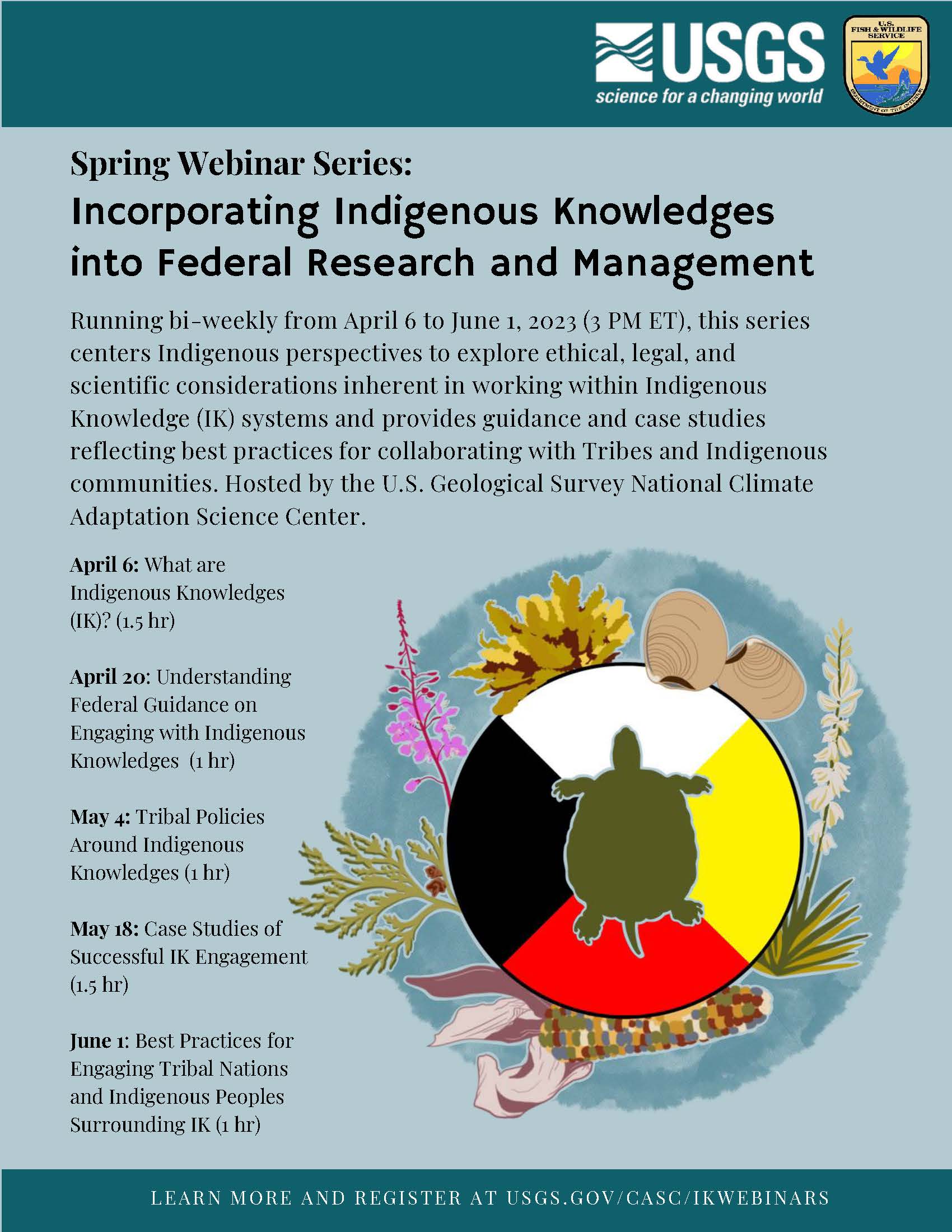
- This event has passed.
Incorporating Indigenous Knowledges into Federal Research and Management

June 1st: Best Practices for Engaging Tribal Nations and Indigenous Peoples Surrounding IK
Sara Kahanamoku (Hawaiʻi Sea Grant Ulana ʻIke Center of Excellence) Mike Durglo (Confederated Salish & Kootenai Tribes)
Registration: https://www.usgs.gov/programs/climate-adaptation-science-centers/webinar-series-incorporating-indigenous-knowledges
The U.S. Geological Survey (USGS) National Climate Adaptation Science Center (National CASC) is hosting a virtual webinar series on how to integrate Indigenous Knowledges (IK) into Federal ecological research and resource management programs. Running bi-weekly from April 6 to June 1, 2023 (3 PM ET), this series centers Indigenous perspectives to explore ethical, legal, and scientific considerations inherent in working within different knowledge systems and provides guidance and case studies reflecting best practices for collaborating with Tribes and Indigenous communities.
Sara Kahanamoku is currently a postdoctoral fellow with the Hawaiʻi Sea Grant Ulana ʻIke Center of Excellence, focusing on utilizing multiple knowledge systems to track historical climate and ecosystem cycles in Hawaiʻi as part of the Rising Voices, Changing Coasts (RVCC) National Indigenous and Earth Sciences Convergence Hub. RVCC has an overarching goal of facilitating convergence research on coastal hazards in a community context through co-production between social and earth sciences and Indigenous knowledge experts. For their PhD research, Sara studied the life history and morphology of benthic foraminifera in the Santa Barbara Basin of California, using fossil records to track population-level trends over the past 2,000 years and investigate the impact of climate change and ecosocial regime shifts, such as impacts stemming from the colonization of California, on foraminifer ecology. Sara has also conducted meta-research on equity in the process of science, including on racial disparities in funding at the National Science Foundation and on place-based science in Hawaiʻi. They previously served as a graduate fellow in the Hawaiʻi Sea Grant Ulana ʻIke Center of Excellence from 2021-2023, while finishing their PhD at UC Berkeley.
Michael Durglo, Jr is Department Head of the Confederated Salish and Kootenai Tribes’s (CSKT) Tribal Historic Department and has been a leader in climate change adaptation work for nearly a decade. He facilitated the development of a Flathead Reservation Climate Change Strategic Plan for CSKT, the third Tribe to do so in the United States. After completing the plan, he continued to build on the work by diving deep into the perspectives of the elders and integrating traditional knowledge into the plan. Particularly unique has been Michael’s all-inclusive and open approach towards climate planning. He has established monthly meetings of a Climate Change Advisory Committee and welcomes all stakeholders, both tribal and non-tribal. This has opened conversations among multiple jurisdictions, connecting people and adding value to solving the problems that will be faced by the impacts of climate change into the future. In 2016, Michael received the White House Champion of Change award and in 2017, Michael received the Climate Leadership Award for Natural Resources. Michael has also brought climate education and action to the youth of the CSKT by establishing the Environment Advocates for Global and Local Ecological Sustainability otherwise known as the “EAGLES”. These youth are learning about, taking responsibility for their environment, and starting young to integrate environmental considerations into their lives. Michael served in the Montana Army National Guard from 1981 to 1987 and is currently a member of the Mission Valley Honor Guard.